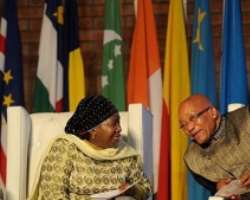After Zuma, another Zuma?

DIVORCING couples usually squabble over custody of the children. Jacob Zuma seems to be wondering how to share custody of the country with his ex-wife. Mr Zuma must retire as South Africa's president in 2019. He appears to favour Nkosazana Dlamini-Zuma, to whom he was married until 1998, as his successor. The couple often appear on stage together at political events, as they did during the African Union (AU) summit in Johannesburg in June.
A quiet race is under way to pick the next president of the ruling party, the African National Congress (ANC). The winner will inevitably become president of the country, too. For Mr Zuma, there is much to commend his ex-wife. For a start, she has not been accused of trying to poison him (unlike one of the current crop of first ladies, whose lawyers issued a statement in which she denied being part of a plot to do so). Furthermore, Ms Dlamini-Zuma has plenty of political experience. She currently chairs the AU. She has served as South Africa's health minister (under Nelson Mandela), foreign minister (under Thabo Mbeki) and home affairs minister (in her ex-husband's cabinet).
She is also loyal. Mr Zuma faced 783 charges of corruption, fraud, money-laundering and tax evasion before he became president. (He denies them all.) These charges were dropped, but the opposition Democratic Alliance is doggedly trying to reinstate them. Mr Zuma's critics speculate that he wants his ex-wife at the helm as an ally to argue that the charges—which he claims are politically motivated—should never see the light of day.
The odds of another Zuma running South Africa are hard to gauge. There is no open, formal campaigning within the ANC. Candidates maintain the fiction that they are “deployed” by the party.
The other strong contender is Cyril Ramaphosa, a union-leader-turned-tycoon who is now deputy president. He has the tacit support of the Congress of South African Trade Unions (COSATU), a part of the ruling alliance. At the COSATU national congress in late November several unions openly backed Mr Ramaphosa, saying that the deputy president of the ANC should succeed as party president, as in the past.
Mr Ramaphosa stands to benefit from the mess Mr Zuma has made of the country's credit rating. In December the president replaced a respected finance minister with an unknown backbencher, spooking the markets. He soon relented and appointed a third finance minister, whom investors trust, but the episode solidified his reputation for capricious decision-making. Even so Mr Ramaphosa, who has a sober, Mr Fix-It reputation, will have to build support softly-softly, in the ANC style.
Ms Dlamini-Zuma received a boost in November when Sihle Zikalala beat a candidate who supported Mr Ramaphosa to be elected as ANC chairman in KwaZulu-Natal province, the party's biggest support base. Three provincial premiers, known as the “Premier League,” are drumming up support for her. Ms Dlamini-Zuma's fans often say that “South Africa is ready for a woman president.”
Would she be any good? Her record in government is not exactly impressive. As health minister, she extended health services to black South Africans but also promoted a quack “cure” for AIDS based on a toxic industrial solvent, and purged South Africa's drug-safety authority when it objected. As foreign minister she failed miserably to address the implosion of next-door Zimbabwe. Some argue that, as home minister, she cleaned up a dysfunctional ministry; others say the reforms were under way before she took over.
On January 8th the ANC will celebrate the anniversary of its founding. It is customary for the president to set out the party's agenda on such occasions, but all eyes will be on the succession struggle behind the scenes. Not long afterwards, probably in May, South Africa will hold municipal elections. If the ANC does poorly, the Zumas will be weakened.
Ms Dlamini-Zuma has said nothing publicly about what she might do if she becomes president. Susan Booysen, author of the book “Dominance and Decline: The ANC in the Time of Zuma”, predicts that she would be much like her ex-husband. That worries liberals, who fret that Mr Zuma has undermined institutions that check presidential power and tolerated widespread corruption. “I think Zuma is going to be with us long after he has actually left office,” says Ms Booysen.
Mr Zuma may not be able to name his own successor, however. He is unpopular, even among ANC supporters. A recent Afrobarometer survey found that public distrust of him had increased from 37% in 2011 to 66% in 2015. “A majority of citizens believe that he routinely ignores both the legislature and the judiciary,” the pollster said. Public approval of his performance dropped from 64% in 2011 to 36% this year.
Mr Zuma giggled throughout his last day of questions in Parliament for the year, despite the serious issues before him: a severe drought, an economy close to recession and reports that taxpayers are to fork out for a brand-new, 4 billion-rand ($251m) presidential jet. After a younger opposition MP scolded him Mr Zuma responded: “I don't know how to stop my laughter.”
(The Economist)
